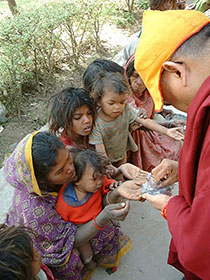- Home
- FPMT Homepage
Foundation for the Preservation of the Mahayana Tradition
The FPMT is an organization devoted to preserving and spreading Mahayana Buddhism worldwide by creating opportunities to listen, reflect, meditate, practice and actualize the unmistaken teachings of the Buddha and based on that experience spreading the Dharma to sentient beings. We provide integrated education through which people’s minds and hearts can be transformed into their highest potential for the benefit of others, inspired by an attitude of universal responsibility and service. We are committed to creating harmonious environments and helping all beings develop their full potential of infinite wisdom and compassion. Our organization is based on the Buddhist tradition of Lama Tsongkhapa of Tibet as taught to us by our founders Lama Thubten Yeshe and Lama Thubten Zopa Rinpoche.
- Willkommen
Die Stiftung zur Erhaltung der Mahayana Tradition (FPMT) ist eine Organisation, die sich weltweit für die Erhaltung und Verbreitung des Mahayana-Buddhismus einsetzt, indem sie Möglichkeiten schafft, den makellosen Lehren des Buddha zuzuhören, über sie zur reflektieren und zu meditieren und auf der Grundlage dieser Erfahrung das Dharma unter den Lebewesen zu verbreiten.
Wir bieten integrierte Schulungswege an, durch denen der Geist und das Herz der Menschen in ihr höchstes Potential verwandelt werden zum Wohl der anderen – inspiriert durch eine Haltung der universellen Verantwortung und dem Wunsch zu dienen. Wir haben uns verpflichtet, harmonische Umgebungen zu schaffen und allen Wesen zu helfen, ihr volles Potenzial unendlicher Weisheit und grenzenlosen Mitgefühls zu verwirklichen.
Unsere Organisation basiert auf der buddhistischen Tradition von Lama Tsongkhapa von Tibet, so wie sie uns von unseren Gründern Lama Thubten Yeshe und Lama Thubten Zopa Rinpoche gelehrt wird.
- Bienvenidos
La Fundación para la preservación de la tradición Mahayana (FPMT) es una organización que se dedica a preservar y difundir el budismo Mahayana en todo el mundo, creando oportunidades para escuchar, reflexionar, meditar, practicar y actualizar las enseñanzas inconfundibles de Buda y en base a esa experiencia difundir el Dharma a los seres.
Proporcionamos una educación integrada a través de la cual las mentes y los corazones de las personas se pueden transformar en su mayor potencial para el beneficio de los demás, inspirados por una actitud de responsabilidad y servicio universales. Estamos comprometidos a crear ambientes armoniosos y ayudar a todos los seres a desarrollar todo su potencial de infinita sabiduría y compasión.
Nuestra organización se basa en la tradición budista de Lama Tsongkhapa del Tíbet como nos lo enseñaron nuestros fundadores Lama Thubten Yeshe y Lama Zopa Rinpoche.
A continuación puede ver una lista de los centros y sus páginas web en su lengua preferida.
- Bienvenue
L’organisation de la FPMT a pour vocation la préservation et la diffusion du bouddhisme du mahayana dans le monde entier. Elle offre l’opportunité d’écouter, de réfléchir, de méditer, de pratiquer et de réaliser les enseignements excellents du Bouddha, pour ensuite transmettre le Dharma à tous les êtres. Nous proposons une formation intégrée grâce à laquelle le cœur et l’esprit de chacun peuvent accomplir leur potentiel le plus élevé pour le bien d’autrui, inspirés par le sens du service et une responsabilité universelle. Nous nous engageons à créer un environnement harmonieux et à aider tous les êtres à épanouir leur potentiel illimité de compassion et de sagesse. Notre organisation s’appuie sur la tradition guéloukpa de Lama Tsongkhapa du Tibet, telle qu’elle a été enseignée par nos fondateurs Lama Thoubtèn Yéshé et Lama Zopa Rinpoché.
Visitez le site de notre Editions Mahayana pour les traductions, conseils et nouvelles du Bureau international en français.
Voici une liste de centres et de leurs sites dans votre langue préférée
- Benvenuto
L’FPMT è un organizzazione il cui scopo è preservare e diffondere il Buddhismo Mahayana nel mondo, creando occasioni di ascolto, riflessione, meditazione e pratica dei perfetti insegnamenti del Buddha, al fine di attualizzare e diffondere il Dharma fra tutti gli esseri senzienti.
Offriamo un’educazione integrata, che può trasformare la mente e i cuori delle persone nel loro massimo potenziale, per il beneficio di tutti gli esseri, ispirati da un’attitudine di responsabilità universale e di servizio.
Il nostro obiettivo è quello di creare contesti armoniosi e aiutare tutti gli esseri a sviluppare in modo completo le proprie potenzialità di infinita saggezza e compassione.
La nostra organizzazione si basa sulla tradizione buddhista di Lama Tsongkhapa del Tibet, così come ci è stata insegnata dai nostri fondatori Lama Thubten Yeshe e Lama Zopa Rinpoche.
Di seguito potete trovare un elenco dei centri e dei loro siti nella lingua da voi prescelta.
- 欢迎 / 歡迎
简体中文
“护持大乘法脉基金会”( 英文简称:FPMT。全名:Foundation for the Preservation of the Mahayana Tradition) 是一个致力于护持和弘扬大乘佛法的国际佛教组织。我们提供听闻,思维,禅修,修行和实证佛陀无误教法的机会,以便让一切众生都能够享受佛法的指引和滋润。
我们全力创造和谐融洽的环境, 为人们提供解行并重的完整佛法教育,以便启发内在的环宇悲心及责任心,并开发内心所蕴藏的巨大潜能 — 无限的智慧与悲心 — 以便利益和服务一切有情。
FPMT的创办人是图腾耶喜喇嘛和喇嘛梭巴仁波切。我们所修习的是由两位上师所教导的,西藏喀巴大师的佛法传承。
繁體中文
護持大乘法脈基金會”( 英文簡稱:FPMT。全名:Found
ation for the Preservation of the Mahayana Tradition ) 是一個致力於護持和弘揚大乘佛法的國際佛教組織。我們提供聽聞, 思維,禪修,修行和實證佛陀無誤教法的機會,以便讓一切眾生都能 夠享受佛法的指引和滋潤。 我們全力創造和諧融洽的環境,
為人們提供解行並重的完整佛法教育,以便啟發內在的環宇悲心及責 任心,並開發內心所蘊藏的巨大潛能 — 無限的智慧與悲心 – – 以便利益和服務一切有情。 FPMT的創辦人是圖騰耶喜喇嘛和喇嘛梭巴仁波切。
我們所修習的是由兩位上師所教導的,西藏喀巴大師的佛法傳承。 察看道场信息:
- FPMT Homepage
- News/Media
-
- Study & Practice
-
-
- About FPMT Education Services
- Latest News
- Programs
- New to Buddhism?
- Buddhist Mind Science: Activating Your Potential
- Heart Advice for Death and Dying
- Discovering Buddhism
- Living in the Path
- Exploring Buddhism
- FPMT Basic Program
- FPMT Masters Program
- FPMT In-Depth Meditation Training
- Maitripa College
- Lotsawa Rinchen Zangpo Translator Program
- Universal Education for Compassion & Wisdom
- Online Learning Center
-
- Prayers & Practice Materials
- Overview of Prayers & Practices
- Full Catalogue of Prayers & Practice Materials
- Explore Popular Topics
- Benefiting Animals
- Chenrezig Resources
- Death & Dying Resources
- Lama Chopa (Guru Puja)
- Lama Zopa Rinpoche: Compendium of Precious Instructions
- Lama Zopa Rinpoche: Life Practice Advice
- Lama Zopa Rinpoche Practice Series
- Lamrim Resources
- Mantras
- Prayer Book Updates
- Purification Practices
- Sutras
- Thought Transformation (Lojong)
- Audio Materials
- Dharma Dates - Tibetan Calendar
- Translation Services
- Publishing Services
- Ways to Offer Support
- Prayers & Practice Materials
-
- Teachings and Advice
- Find Teachings and Advice
- Lama Zopa Rinpoche Advice Page
- Lama Zopa Rinpoche: Compendium of Precious Instructions
- Lama Zopa Rinpoche Video Teachings
- ༧སྐྱབས་རྗེ་བཟོད་པ་རིན་པོ་ཆེ་མཆོག་ནས་སྩལ་བའི་བཀའ་སློབ་བརྙན་འཕྲིན།
- Podcasts
- Lama Yeshe Wisdom Archive
- Buddhism FAQ
- Dharma for Young People
- Resources on Holy Objects
- Teachings and Advice
-
-
*If a menu item has a submenu clicking once will expand the menu clicking twice will open the page.
-
-
- Centers
-
- Teachers
-
- Projects
-
-
-
-
*If a menu item has a submenu clicking once will expand the menu clicking twice will open the page.
-
-
- FPMT
-
-
-
-
-
Whatever problem one experiences if one thinks about the benefits of problems and how they are beneficial for ones own life, to develop ones mind in compassion, to develop loving kindness, patience, wisdom, and all the positive qualities for the path to liberation. By thinking of the benefits one develops this precious quality, this most healthy positive way of thinking that brings happiness and that stops you from harming yourself and stops you from harming others.
Share
Lama Zopa Rinpoche
-
-
-
- Shop
-
-
-
The Foundation Store is FPMT’s online shop and features a vast selection of Buddhist study and practice materials written or recommended by our lineage gurus. These items include homestudy programs, prayers and practices in PDF or eBook format, materials for children, and other resources to support practitioners.
Items displayed in the shop are made available for Dharma practice and educational purposes, and never for the purpose of profiting from their sale. Please read FPMT Foundation Store Policy Regarding Dharma Items for more information.
-
-
23
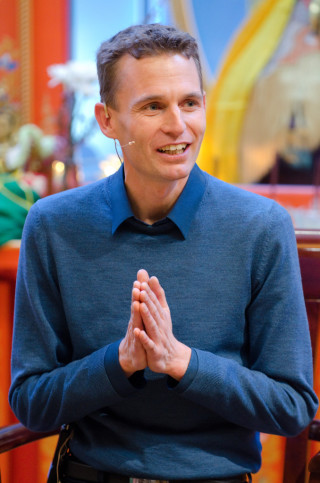
Rasmus Hougaard, Maitripa College, Portland, Oregon, US, February 2015. Photo by Marc Sakamoto.
Rasmus Hougaard is the founder and managing director of the Potential Project, an international program based in Copenhagen, Denmark, that works with corporations and organizations to equip their leaders and employees with methods to be more kind, clear-minded, focused and efficient. Active in Europe, Asia, Australia and North America, the Potential Project provides Corporate-Based Mindfulness Training, which is a learning program recognized by the Foundation for Developing Compassion and Wisdom (FDCW), an FPMT-affiliated project devoted to developing and promoting Lama Yeshe’s vision of universal education. Rasmus spoke with Mandala managing editor Laura Miller in February 2015, during a visit to Maitripa College in Portland, Oregon, US.
Laura Miller: Tell me a little about yourself and how you came to start the Potential Project.
Rasmus Hougaard: I’m an FPMT student. I’ve been that for quite a few years and I feel very closely related to Lama Zopa Rinpoche – just as much as through Lama Yeshe’s vision of universal education, which is promoted by FDCW. I have been a director of Tong-nyi Nying-je Ling, the FPMT center in Copenhagen, for a number of years. I have been guiding classes there for many years. I’ve been teaching retreats at FPMT centers around Europe and the world for around the last eight years or so, so I feel very close to FPMT. It is really my family for sure.
Also, I have this very, very strong connection with the whole idea of universal education as Lama Yeshe taught it himself. That really blew my mind when I first heard about it. I joined what would become the FDCW team in London – before it was really a team – when Allison Murdoch was just beginning to start it up years ago. I was part of the first training course on the 16 Guidelines, the trainer training for that and a number of other things.
At some point, I took a year off to figure out how I could create the most benefit in this short lifetime. I came to the conclusion after a year thinking that I should bring “mind training” – what I call “Dharma in disguise” – into other for-profit and non-profit organizations. I had three main reasons for the project. One is because people in those environments need it a lot, because they are very stressed and they need good tools to cope. You can bring them Dharma in a way in which they will embrace it. They won’t go to a Dharma center. Another reason is there is a lot of power in organizations nowadays, so if you can influence them to think more ethically, more compassionately, then there could be a really nice ripple throughout the world, not just in those companies that we would work with. The last one was that everyone needs to be able to make a living off the work that they do, and I just know so many good Dharma students who are working with all kinds of jobs that are fine and good, but where they are not using their best skills of teaching the Dharma. I thought that if we could create a vehicle whereby Dharma teachers could actually join and go and spread the Dharma in disguise in organizations, we would have more happy people, have a better world, and would have income that we could then donate to organizations like Maitripa College or the many other FPMT-related center, projects and services. That is where it all came from – a vision of doing a lot of good in a very focused way.
Laura: What’s the best way to teach mindfulness? Can we get all the potential benefits of developing mindfulness from Dharma practice in the traditional way of studying the texts, meditating and doing the practices? Or does Western science add something to this that helps us integrate it better into our modern lives? What is your perspective on the spectrum of very traditional presentations to very secular?
Rasmus: I think, to make use of the words of the Buddha, the Dharma has “one taste,” and it is the taste of freedom. That taste can be presented in many, many different ways. It could be presented, as you say, very traditionally or very secularly. In my mind, it really doesn’t matter what you do. It is just important that you think about who your audience is, and then do what works for them – skillful means. I am not attached to the secular. I am not attached to the traditional. I am focused on finding ways of delivering the same messages, the same core, the same essence, the same methods, the same wisdom to people in a way that they can relate to it.
In our work at the Potential Project, we go out to people not only who are not interested in Dharma, but they are not necessarily even interested in mindfulness. The organizations pay for us to do the work, but the people signing up for the course haven’t asked for it necessarily. We have to be very, very skillful in presenting mindfulness in a way where they are attracted to it right away and where they find some benefits right away. That is really what I think is very important: look at what the audience needs.
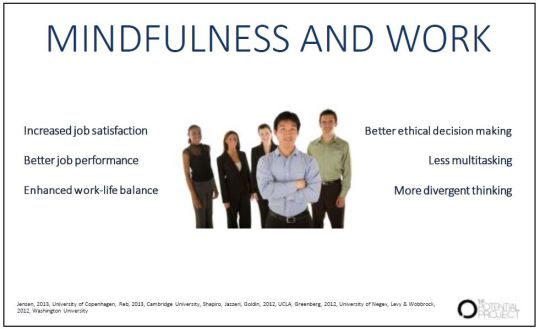
Slide from Potential Project workshop. Courtesy of Rasmus Hougaard.
Laura: When the Potential Project is brought into a company, what do you do? Could you describe the process and the work itself?
Rasmus: In terms of schedule, we do many different things. What we prefer to do is a large “implementation program,” as we call it. This is an 11-workshop program where we come in for 11 sessions spread over four months. Each session is one and a half hours. We are teaching them basically three things. The first thing is the actual mindfulness practice. During the first five weeks, we teach them what in Sanskrit is called shamatha training – stilling the mind – shiné in Tibetan. From there we move into vipassana, or what’s called in Tibetan lhaktong training. We go into the basic philosophy of impermanence, dissatisfaction and emptiness. So that is the foundation of the actual mind training. On top of that, we build a layer of skills that we call “mental strategies,” which are really basic Buddhist principles of patience, compassion, beginner’s mind, acceptance – those basic things that you need to develop in your life if you want not only a happier life, but also a life where you are more in tune with other people and where you can be more effective in your work.
Then the last layer of skills we help develop are specifically designed for the audience we are talking to and is about relating mindfulness to their work. For example, how can you use and how can you develop more focus and more insight in your way of answering and receiving email? How can you develop your mind to be more focused and be more clear and wise in your meetings? How do you do that when setting goals and priorities, when planning your time? So all those practices that we have to do while we are at work, how can we utilize the power of training the mind and how can we train the mind while engaging in those activities?
Laura: What kind of responses do you get from this, and have you seen changes within companies that have done your trainings?
Rasmus: The very short answer is yes, definitely, we’ve seen changes. Before the Potential Project started doing this work, I had been teaching meditation in Dharma centers and I had seen people coming in being very motivated and making good progress over a number of years. When we started going into organizations, I thought I would never experience the same kind of motivation and the same kind of progress. However, I was very surprised to see that the transformation actually went sometimes much faster. You go into a full department and they all together embark on this journey of developing a mind that is clearer, calmer and more kind, and they actually do it during working hours. They start to change their work culture based on these principles. It is almost like a retreat because they are there for 8 or 10 hours every day. They make amazing progress fairly fast.
Laura: I have seen articles critical of bringing mindfulness into corporate situations – basically, the concern is whether ethics and compassion are being left out of mindfulness instruction. I think there is a fear that mindfulness could be used by corporations to become more profitable at the expense of poor people and so forth. I’m sure you have seen these critiques. What are your thoughts about this?
Rasmus: I fully understand the criticism and the whole backlash against mindfulness. I have to be honest, I also sympathize with a large part of it. I don’t want to play holy and say we do everything right, because honestly, I don’t know what is right and what is not right. I have some good ideas and I have been checking with my teachers. I think one of the problems with the very secular mindfulness that we see nowadays is that it is a very, very watered down, stripped down version of the Dharma. I wouldn’t even call it Dharma. It is really a psychological approach to the suffering of samsara, that is, how can you alleviate a bit of distress that you are experiencing. Whether it is unethical or not, I don’t know. If that is unethical, then neuro-linguistic programing and many other things are also unethical. I don’t want to have a standpoint on that. From my point of view, coming from a Dharma background, merely alleviating distress is certainly not what we are interested in. We first of all take the actual practice very seriously. Shamata is not for fun. Shamata is a serious practice. It is hard work. Lhaktong practice, vipassana, is not always fun. It can be very painful. It can be very tough. We don’t try to make it easier; we don’t try to wrap it in a way where it is easier than it is supposed to be.
I think there are two things that should always be there in mindfulness: one is the ethical component and the other one is the compassionate component. Without those two, I think you have lost the essence of mindfulness. Our presentation of mindfulness is coming from Buddhism. You can’t take away from that, and you can’t disregard all of the masters of the past that have said that mindfulness, ethics and compassion go hand-in-hand. You can’t have real mindfulness without having compassion. So it is a big part of our program, although not obviously. We don’t tell our clients, “We teach compassion in our ethical program,” because they would never engage with us. We tell them instead that we are coming with a mindfulness program that will make their employees more effective, more calm, more kind, and then we introduce ideas of compassion once we’re in the door.
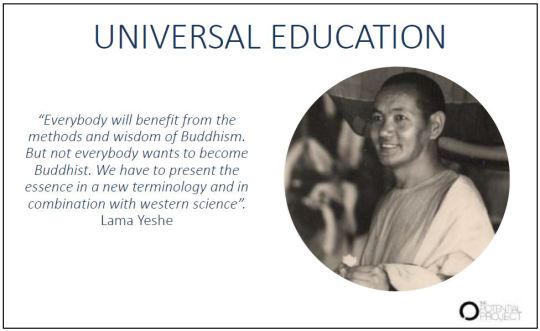
Slide from Potential Project workshop. Courtesy of Rasmus Hougaard.
Laura: How do you introduce compassion within the corporate setting?
Rasmus: We work with American Express. We work with Microsoft. We work with Accenture. We work with really hardcore, performing, conservative organizations. How do we introduce compassion? We don’t use the word “compassion” – that’s the first thing. We just call it “kindness.” Everyone can agree to kindness, but compassion is a little bit too fluffy for them.
We work with a global consultancy firm, the leading one in the world, in their Manhattan office in New York. When we had the sessions specifically on kindness, because they had been meditating for five to six weeks by then and because so many new seeds had been planted in their minds, they started seeing kindness as not just a nice idea, but something that would benefit themselves and others, and also as a foundation of their way of doing business. They understood that if they could have a real, kind, compassionate approach to their clients, their clients would probably be happier and also would buy more products from them. They suddenly saw a very virtuous circle: they develop good attitudes within themselves, they serve their clients better, and they receive more business, which is nice for them and nice for everyone, as long as the intention is right.
We find communicating these ideas astonishingly easy because human beings are good beings. We don’t want to be evil and we don’t want to suffer; we want to be happy and we want others to be happy as well. If we just provide the space where people can develop this, we find that it comes very much by itself, although we do help them a bit.
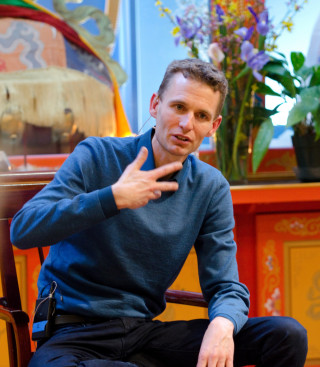
Rasmus Hougaard, Maitripa College, Portland, Oregon, US, February 2015. Photo by Marc Sakamoto.
Laura: Let’s talk about email. (laugh)
Rasmus: (laugh) Emails, yeah.
Laura: Over the last year I’ve gone to a couple meetings – the CPMT meeting in Australia – and I was at the North American Regional Meeting and the Foundation Service Seminar, and for people working within the FPMT organization at Dharma centers or in the International Office, I hear people talking about being overwhelmed by email. It’s something I definitely experience and struggle with. And we also have experiences with misunderstandings and confusion resulting from emails. What kinds of ideas and strategies do you talk about in a Potential Project session concerning email? What is something that I can learn from you today about how to do email better?
Rasmus: This ties into your question about whether we present mindfulness in a traditional Dharma way or in a secular way. For this, I’ll just give a completely, stripped down, secular approach to how can you better harness the potential of your mind in your way of dealing with email.
A fundamental aspect about email is that it is one of the biggest triggers of dopamine in your brain, which scientifically is a way of talking about what is called “attachment” from the Buddhist perspective. We have a strong attachment/aversion relationship with our email. We are very compelled to constantly check it. Most people check their email all the time. The downside of that is that it is stressful and it is very inefficient. You get more stressed because you don’t get enough done. The mind, because of both aversion and attraction, just wants to check email all the time, which we end up doing. The more we do it, the more we get into the habit of doing it. And we get more habitual in terms of attachment and aversion. That is not very useful, so we need to find strategies for pausing and distancing ourselves from this mind.
One is to not check email first thing in the morning. When you wake up in the morning and you have done your practice, you come into the office with an expansive, focused mind. If you started the day writing a very important article or doing another thing that really requires your clarity and focus of mind, you would be very well off. But many of us instead open our email program and immediately are bombarded with all the details and unresolved issues of yesterday; today becomes all the crap from yesterday, basically. Not checking email for the first 15 minutes, maybe 60 minutes, maybe two hours in the morning is a very smart strategy.
Another one that is very important is not to have your email open all the time, because if it is open all the time, it will constantly remind you that there is something that could be triggering some dopamine in your brain. Close down all your digital communication for different periods of times throughout the day. Or, say that from 9 a.m. to 10 a.m. and from 2 p.m. and 3 p.m. are the times when I will be checking my email, and no times else. Those are very basic things. Also, switch off all your alerts, all the bells and whistles and all the notifications. There are many small, very practical things you can do whereby you’ll be more focused and less stressed and actually have a more equanimous, balanced mind because you are not driven by that rush of reading new things all the time. Create less addiction.
Laura: Have you seen the results of that with some of your clients? Could you talk about that a little bit, because it seems very difficult to imagine in a certain sense.
Rasmus: As a disclaimer: people may think that I’m just sitting around in a nice Buddhist setting, that because I come from a Buddhist background I must be a hippie from Denmark, the world’s happiest country. But the Potential Project is an organization with 140 people now. We are in 20 countries. We are very, very busy. I travel all the time. This advice is not coming from someone who is having a very easygoing work life. It can be quite tough, actually.
So what have our clients done? I can give a few examples. Carlsberg, a Danish brewer, with whom we worked with over a year implementing this mindfulness program in their entire organization, ended up switching off their email servers at 6 p.m. and reopening them at 6 a.m. They switched off email activities for 12 hours every day for the reason that they didn’t want people to be spammed with emails into the night instead of being home with their families.
A large insurance company decided on email-free Wednesdays. On Wednesdays, no internal email simply allowed employees to be able to have quality time together and to be able to focus on the important things rather than on a constant stream of email all the time. We see many interesting initiatives to basically develop a more calm and mindful way of working rather than just perpetuating the habit that we are all in nowadays.
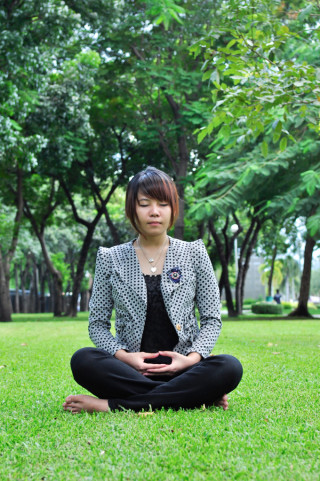
Photo: Dreamstime.
Laura: How does someone get involved with the Potential Project? Is there a path to becoming a trainer?
Rasmus: There certainly there is. You can go on our website and find the “Want to join?” section. There is an application form that needs to be filled in and sent to us. We do have quite a few FPMT folks within our organization. Having said that, we have found that it is not enough for people to have a good Dharma background. People also need to have a good meditation background, which is not always the case for everyone having a Dharma background. It is also very important that they have a deep experience of what work life is like in a large organization because we have found that if you don’t have that, you can’t really relate to the reality that people are facing. People can easily perceive you as a little bit flaky and it is not very well received, just as if you were bringing a real business man to talk in a Dharma center. Dharma students maybe wouldn’t relate so well to it because they would rather see a trained Dharma teacher. If you go into an organization, you need to have a corporate appeal that will help them see that you really understand their world.
One thing that is important for me to emphasize is that the work that we are doing could never have been possible without FPMT and without many great Dharma teachers, the real Dharma teachers that have been supporting this for many years, maintain our integrity, keeping the messages really clear that it is Dharma and not just a new psychological model or well-being approach. We touched or reached 25,000 people last year. It is only due to the kindness of all the great teachers of FPMT and other organizations.
Learn more from Rasmus in “The Potential Project and Corporate-Based Midnfulness Training” from Mandala April-June 2014. Find even more about the Potential Project at http://potentialproject.com.
- Home
- News/Media
- Study & Practice
- About FPMT Education Services
- Latest News
- Programs
- New to Buddhism?
- Buddhist Mind Science: Activating Your Potential
- Heart Advice for Death and Dying
- Discovering Buddhism
- Living in the Path
- Exploring Buddhism
- FPMT Basic Program
- FPMT Masters Program
- FPMT In-Depth Meditation Training
- Maitripa College
- Lotsawa Rinchen Zangpo Translator Program
- Universal Education for Compassion & Wisdom
- Online Learning Center
- Prayers & Practice Materials
- Overview of Prayers & Practices
- Full Catalogue of Prayers & Practice Materials
- Explore Popular Topics
- Benefiting Animals
- Chenrezig Resources
- Death & Dying Resources
- Lama Chopa (Guru Puja)
- Lama Zopa Rinpoche: Compendium of Precious Instructions
- Lama Zopa Rinpoche: Life Practice Advice
- Lama Zopa Rinpoche Practice Series
- Lamrim Resources
- Mantras
- Prayer Book Updates
- Purification Practices
- Sutras
- Thought Transformation (Lojong)
- Audio Materials
- Dharma Dates – Tibetan Calendar
- Translation Services
- Publishing Services
- Teachings and Advice
- Find Teachings and Advice
- Lama Zopa Rinpoche Advice Page
- Lama Zopa Rinpoche: Compendium of Precious Instructions
- Lama Zopa Rinpoche Video Teachings
- ༧སྐྱབས་རྗེ་བཟོད་པ་རིན་པོ་ཆེ་མཆོག་ནས་སྩལ་བའི་བཀའ་སློབ་བརྙན་འཕྲིན།
- Podcasts
- Lama Yeshe Wisdom Archive
- Buddhism FAQ
- Dharma for Young People
- Resources on Holy Objects
- Ways to Offer Support
- Centers
- Affiliates Area
- Teachers
- Projects
- Charitable Projects
- Make a Donation
- Applying for Grants
- News about Projects
- Other Projects within FPMT
- Support International Office
- Projects Photo Galleries
- Give Where Most Needed
- FPMT
- Shop
Translate*
*powered by Google TranslateTranslation of pages on fpmt.org is performed by Google Translate, a third party service which FPMT has no control over. The service provides automated computer translations that are only an approximation of the websites' original content. The translations should not be considered exact and only used as a rough guide.Happiness and suffering come from your own mind, not from outside. Your own mind is the cause of happiness; your own mind is the cause of suffering. To obtain happiness and pacify suffering, you have to work within your own mind.







